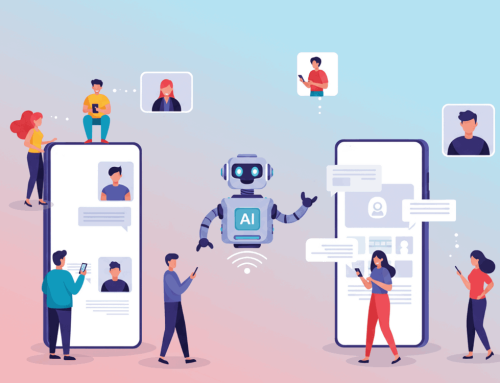Customer service is no longer about simply answering queries — it is now a critical part of shaping customer experience and brand loyalty. With the rise of digital technologies, customers expect instant responses, personalised solutions, and 24/7 availability. Meeting these expectations manually can be both costly and resource-intensive.
This is where AI in customer service has emerged as a game-changer. By automating repetitive tasks, predicting customer needs, and enabling real-time engagement, artificial intelligence empowers businesses to deliver seamless service while reducing operational costs.
In this blog, we explore 10 practical ways businesses can use AI in customer service to strengthen relationships, improve efficiency, and stay competitive in an increasingly digital-first world.
1. Chatbots for Instant Customer Support
One of the most common applications of AI in customer service is the use of chatbots. These AI-powered virtual assistants are designed to provide instant responses to customer queries, reducing wait times and improving satisfaction.
How AI Chatbots Work
- They use natural language processing (NLP) to understand customer intent.
- They can provide answers to frequently asked questions, track orders, and even troubleshoot basic technical problems.
- Advanced chatbots integrate with CRM systems, giving them access to past customer interactions for more personalised responses.
Benefits of Chatbots
- 24/7 availability – customers can get support any time of day.
- Reduced workload – customer service teams can focus on complex issues rather than repetitive queries.
- Scalability – chatbots can handle thousands of conversations simultaneously without performance loss.
- Cost-effectiveness – businesses save on staffing costs while maintaining high-quality service.
Example in Action
A retail business could use an AI chatbot on its website to answer questions about delivery times, return policies, or stock availability. Instead of waiting for an agent, the customer receives immediate assistance, leading to quicker resolutions and a better experience.
2. Personalised Customer Experiences with AI
A major strength of AI in customer service is its ability to deliver personalisation at scale. Today’s customers expect companies to understand their preferences and provide tailored recommendations, and AI makes this possible by analysing large volumes of customer data in real time.
How AI Enables Personalisation
- Customer Data Analysis: AI systems analyse purchase history, browsing behaviour, and prior interactions to anticipate needs.
- Dynamic Recommendations: Similar to how streaming services suggest shows or e-commerce platforms recommend products, AI can tailor responses in support channels.
- Sentiment Analysis: AI evaluates customer tone and emotions during interactions, allowing responses to be adjusted accordingly.
Benefits of AI-Driven Personalisation
- Higher customer satisfaction – customers feel understood and valued.
- Improved loyalty and retention – personalised experiences encourage repeat business.
- Upselling and cross-selling opportunities – AI can recommend complementary products or services during customer interactions.
Example in Action
An online banking platform could use AI to personalise customer service by suggesting relevant financial products based on spending patterns and account activity. For example, if a customer often incurs overdraft fees, AI could prompt the service team to recommend an overdraft protection plan.
3. Predictive Customer Support with AI
Another powerful use of AI in customer service is predictive support. Rather than waiting for customers to contact support teams with issues, AI analyses data patterns to anticipate problems before they arise.
How Predictive AI Works
- Data Monitoring: AI tools monitor customer accounts, product usage, or service interactions.
- Behavioural Analysis: Machine learning models identify unusual patterns, such as reduced activity or frequent error messages.
- Proactive Alerts: Customers can be contacted with solutions before they even realise there is a problem.
Benefits of Predictive Support
- Prevents escalations – issues are resolved early, avoiding frustration.
- Enhances customer trust – customers see the business as proactive and reliable.
- Reduces support volume – by addressing common issues in advance, fewer tickets are raised.
- Boosts retention – proactive service increases loyalty and reduces churn.
Example in Action
A telecom company could use predictive AI to detect when a customer’s internet usage pattern indicates an upcoming bandwidth issue. The system could automatically notify the customer and suggest an upgrade or adjustment before service disruption occurs.
4. AI-Powered Self-Service Portals

The modern customer values independence and speed. With AI in customer service, businesses can offer intelligent self-service portals that empower customers to resolve issues without needing to contact a human agent.
How AI Enhances Self-Service
- Smart Knowledge Bases: AI systems continuously update and refine FAQs, articles, and guides based on common queries and feedback.
- Search Optimisation: Natural language search ensures customers can type questions in their own words and still find accurate answers.
- Virtual Assistants: AI-powered assistants guide customers step by step through troubleshooting or account management.
Benefits of Self-Service AI
- Faster resolutions – customers can solve issues instantly.
- Reduced support costs – fewer enquiries reach human agents.
- Customer empowerment – users feel more in control of their experience.
- Consistent information – AI ensures the knowledge base is always up-to-date.
Example in Action
A software company could deploy an AI-powered help centre where customers type in error messages or questions and receive tailored solutions. If the system detects recurring issues, it can automatically suggest fixes or update its knowledge base.
5. Voice Assistants and AI in Call Centres
While digital chat has become dominant, phone-based support is still vital in many industries. The integration of AI in customer service has transformed call centres, particularly through voice assistants and automated response systems.
How AI Voice Assistants Work
- Speech Recognition: AI systems use advanced speech-to-text capabilities to understand customer queries.
- Natural Language Processing (NLP): They interpret intent rather than just keywords, enabling more natural conversations.
- Integration with CRM: Voice AI can access account details instantly, giving agents relevant information without delays.
Benefits of AI in Call Centres
- Reduced wait times – AI routes calls more effectively to the right department or resolves them automatically.
- Enhanced efficiency – agents spend less time on repetitive tasks and more on complex issues.
- Consistency in responses – AI ensures that every customer receives accurate information.
- Lower operational costs – automation reduces the need for large call-handling teams.
Example in Action
A utility company could use AI-driven voice assistants to handle high call volumes during billing cycles. Instead of waiting for an agent, customers could ask the AI about their account balance, payment due dates, or usage history.
6. AI for Multilingual Customer Support
Global businesses often face the challenge of serving customers who speak different languages. With AI in customer service, companies can overcome this barrier by offering multilingual support without the need for large teams of translators.
How AI Enables Multilingual Support
- Real-Time Translation: AI translates customer queries and responses instantly, making communication seamless.
- Contextual Understanding: Unlike basic translation tools, advanced AI systems maintain accuracy by considering cultural and linguistic nuances.
- Voice and Text Integration: AI can handle both written and spoken translations, providing flexibility across channels.
Benefits of AI Multilingual Support
- Expanded customer reach – businesses can serve global audiences.
- Faster resolutions – no need to transfer customers to language-specific teams.
- Cost savings – reduces reliance on human translators.
- Improved inclusivity – ensures every customer feels understood and valued.
Example in Action
An e-commerce business operating in Europe could use AI-powered translation tools in its chat and email support systems. A German customer could ask a question in their native language, and the AI would instantly translate it for an English-speaking agent, then translate the reply back into German.
7. Sentiment Analysis and Customer Emotions

understanding a customer’s emotions is just as important as solving their problem. AI in customer service uses sentiment analysis to gauge the tone, mood, and attitude of customers during interactions. This allows businesses to respond more effectively and empathetically.
How Sentiment Analysis Works
- Text Analysis: AI scans messages, emails, and chat transcripts for emotional indicators (e.g., frustration, happiness, urgency).
- Voice Analysis: In call centres, AI analyses pitch, tone, and pace of speech to detect stress or dissatisfaction.
- Real-Time Alerts: If a customer shows signs of anger or frustration, AI can notify an agent to intervene quickly.
Benefits of Sentiment Analysis in Customer Service
- Improves customer satisfaction – agents adapt their tone and solutions to match customer emotions.
- Prevents escalation – issues can be defused before they become complaints.
- Provides actionable insights – businesses learn common pain points and frustrations.
- Strengthens customer loyalty – empathetic responses foster stronger relationships.
Example in Action
A travel company using live chat could deploy sentiment analysis to detect when a customer becomes frustrated about a delayed booking. The AI could alert a manager or escalate the case to a senior agent to ensure the issue is resolved quickly and with extra care.
8. Automating Repetitive Tasks with AI
One of the most significant advantages of AI in customer service is its ability to handle repetitive, time-consuming tasks. By automating these processes, businesses free up human agents to focus on complex, value-driven interactions.
How AI Automates Repetitive Tasks
- Ticket Categorisation: AI can automatically assign queries to the correct department based on content.
- Response Templates: Frequently asked questions are answered instantly without agent intervention.
- Data Entry: AI updates CRM systems with customer information after each interaction.
- Order Tracking & Status Updates: AI can instantly provide customers with updates without human input.
Benefits of Task Automation
- Increases efficiency – support teams spend more time on meaningful work.
- Reduces human error – automation ensures accuracy in data entry and responses.
- Speeds up resolutions – customers receive faster answers to common questions.
- Scales operations – businesses can handle growing customer demand without scaling headcount at the same rate.
Example in Action
An airline could use AI to automatically send flight status updates, rebooking confirmations, and luggage tracking information to passengers. Instead of calling customer service, customers get timely information delivered straight to their phones.
9. AI-Driven Analytics and Insights
Every customer interaction generates valuable data. With AI in customer service, businesses can go beyond simple metrics and gain deep insights into customer behaviour, preferences, and pain points.
How AI Enhances Customer Analytics
- Pattern Recognition: AI identifies recurring issues across thousands of interactions.
- Customer Journey Mapping: It tracks how customers move across touchpoints, highlighting bottlenecks or drop-off points.
- Performance Analysis: AI measures agent efficiency, response times, and resolution quality.
- Predictive Insights: It forecasts future customer behaviour, such as churn risk or product demand.
Benefits of AI-Driven Insights
- Data-backed decisions – businesses can refine products and services based on real customer feedback.
- Improved agent training – insights help identify knowledge gaps or performance issues.
- Enhanced personalisation – data enables more tailored customer experiences.
- Increased ROI – identifying inefficiencies helps reduce costs and improve customer retention.
Example in Action
A subscription-based business could use AI analytics to identify why customers cancel memberships. If AI detects a pattern that cancellations often follow billing issues, the business can take proactive steps to simplify its payment processes.
- and Augmented Reality (AR): AI could support customers visually through AR tools, guiding them in real-time for product setup or troubleshooting.
- Voice Biometrics: AI verifying customer identity through voice patterns for faster and more secure authentication.
- Hyper-Personalisation: AI predicting not just what customers want now, but anticipating future needs with precision.
Benefits for Businesses and Customers
- Seamless experiences – customers will interact with businesses effortlessly across multiple channels.
- Proactive problem solving – AI will increasingly identify and resolve issues before customers notice.
- Greater efficiency – reduced costs, faster resolutions, and smarter workflows.
- Enhanced customer trust – transparent and secure AI systems will foster confidence.
Example in Action
Imagine a smart home provider offering AI-driven video assistance, where a customer points their phone at a device, and AI provides step-by-step instructions in real time, eliminating the need for traditional support calls.
Harnessing the Power of AI in Customer Service
The role of AI in customer service goes far beyond automation — it is about creating smarter, faster, and more personalised experiences that meet the evolving expectations of today’s customers. From chatbots and predictive support to multilingual assistance and advanced analytics, businesses that embrace AI can unlock efficiency, reduce costs, and build stronger customer relationships.
As technology advances, the future will bring even more powerful tools that not only solve customer issues but also anticipate them before they arise. The organisations that adopt these solutions early will stand out for their ability to deliver seamless, customer-first experiences in an increasingly competitive market.
This shift is especially evident in sectors like healthcare, where AI agents are already transforming patient care, diagnostics, and operational efficiency. To explore how these innovations are reshaping the industry, read What is the Future of AI Agents in Healthcare?
At Smart Digitants, we specialise in helping businesses leverage the latest AI solutions to transform customer engagement. Whether you’re looking to implement chatbots, design personalised experiences, or harness AI analytics, our experts can guide you every step of the way.
Get in touch with Smart Digitants today to discover how AI Agent service can elevate your business and deliver results that matter.
Our Content Writing Team at Smart Digitants is a group of dedicated professionals, passionate about creating high-quality, engaging content.
- 1. Chatbots for Instant Customer Support
- 2. Personalised Customer Experiences with AI
- 3. Predictive Customer Support with AI
- 4. AI-Powered Self-Service Portals
- 5. Voice Assistants and AI in Call Centres
- 6. AI for Multilingual Customer Support
- 7. Sentiment Analysis and Customer Emotions
- 8. Automating Repetitive Tasks with AI
- 9. AI-Driven Analytics and Insights
- Harnessing the Power of AI in Customer Service










